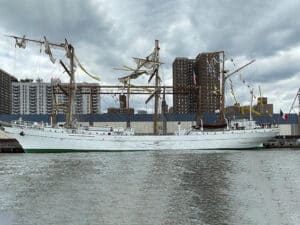
U.K. pilot boat trials Zelim man-overboard recovery conveyor
Written by Nick Blenkey
Photo: Zelim
The U.K.’s Milford Haven Port Authority (MHPA) has retrofitted its 19-meter pilot boat Picton with Zelim’s SWIFT man-overboard recovery conveyor as part of a three-month trial to assess the system’s capability in high sea states.
The Port of Milford Haven, located in Pembrokeshire, Wales, frequently endures high sea states due to its geographical location and exposure to Atlantic swells. The man-overboard recovery conveyor has been insalledas part of a three-month trial to assess the system’s capability in high sea states and follows a technology demonstration carried out last year on the River Forth, Scotland, in which multiple in-water “casualties” were recovered in under one minute from falling overboard.
“Demonstrations last year were a huge success, but the MHPA wanted to retrofit SWIFT to an operational vessel to validate its capability in heavy weather before making any procurement decisions,” said Andy Tipping, Zelim’s business development director. “Performance is so far as expected. Picton has already trialed SWIFT in 2.5 meter swells, which is the most challenging sea condition we have encountered to date. It’s taken SWIFT to a new level, but it still performed very, very well, as we knew it would.”

John Warneford, MHPA’s assistant harbourmaster, said: “With the building of new heavy weather pilot boats underway, we were keen to trial SWIFT aboard an operational pilot boat. These trials allow us to better understand how the technology can improve operational safety for our crews and pilots, but it also supports the rapid recovery of any person in the water, especially given the challenging maritime conditions our crews and customers’ crews face.”
If the trials are a success, SWIFT could be integrated into a series of 22 meter pilot boat newbuilds under construction, the first of which Netherlands-based Next Generation Shipyards is set to deliver to MHPA next year.
“Pilot boats present a particular challenge to seafarers as they provide a vital service in the worst possible maritime conditions. We have all seen YouTube videos of pilots falling into the sea as they board vessels. This is one of the most dangerous jobs in the maritime industry,” said Tipping. “A SWIFT installation has the potential to set the benchmark high for crew safety.”
SWIFT, which received Lloyd’s Register Type Approval in June (see earlier story), is a treadmill-like man-overboard recovery conveyor belt system hinged to a rescue crafts’ stern or side. Once the rescue vessel nears the casualty, the conveyor is lowered into the water. Casualties are simply and quickly pulled free of the water upon traction with the conveyor belt system.
“Port and harbor authorities across the world understand the significant challenges and associated risks involved when someone falls overboard during pilotage operations,” said Sam Mayall, Zelim’s CEO and founder. “The clock starts ticking the moment someone falls overboard, so the faster you can get someone out of the water the greater the chances of recovering them safely and unharmed.”




